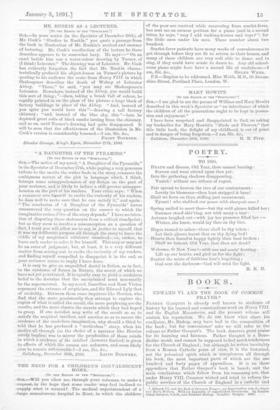"A DAUGHTER OF THE PYRAMIDS." [To THE EDITOR OP TEE
"SPECTATOR."] -Szn,—The notice of my novel, "A Daughter of the Pyramids," in the Spectator of December 27th, while paying a very generous ,tribute to the merits the writer finds in the story, censures the ambiguous nature of the plot in language which, I think, =betrays some misapprehension of my design on the part of _your reviewer, and is likely to induce a still greater misappre- hension on the part of his readers. Your critic says : "When a romancer sets himself to excite the curiosity of his readers, he does well to make sure that he can satisfy it," and again :
The conclusion of A Daughter of the Pyramids,' leaves unanswered the very question on the answer to which the imaginative raison &etre of the story depends." I have no inten- tion of disputing these statements from a critical standpoint; but as they seem to involve a misconception on a question of efact, I trust you will allow me to say, in justice to myself, that it was my deliberate purpose all through the story to leave the ;riddle of my magician's existence unsolved,—or, rather, to leave each reader to solve it for himself. This ma.y or may not (be an error of judgment ; but, at least, it is a very different -matter from Betting out to excite the curiosity of my readers, and finding myself compelled to disappoint it in the end, as . your reviewer seems to imply I have done.
It is easy to give an unqualified denial in fiction, as in fact, 'to the existence of forces in Nature, the secret of which we &aye not yet penetrated. It is equally easy to yield a credulous belief to the doctrine that the unexplained must necessarily Ise the supernatural. In my novel, Sancillon and Rose Vivian vepresent the extreme of scepticism, and Sir Edward Lyly that of credulity. Between them come inquirers like Herries, who 'find that the more persistently they attempt to explore the xregion of what is called the occult, the more perplexing are the results, and the more elusive the secrets which they had hoped to grasp. If one novelist may write of the occult so as to satisfy the sceptical intellect, and another so as to ensure the credence of the credulous imagination, why should a third he -told that he has produced a ' motiveless" story, when his =motive all through (as the choice of a narrator like Herries surely implies) was to mirror the perplexities of those minds in which a credence of the intellect (however limited) is given ‘to effects of which the -causes are unknown, and seem likely
.ever to remain unknowable P—I am, Sir, Sw., Salisbury, December 80th, 1890. LEITH DERWENT.














































 Previous page
Previous page